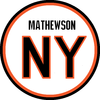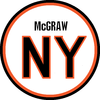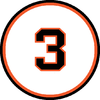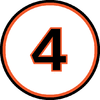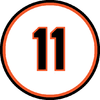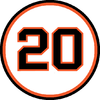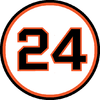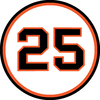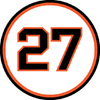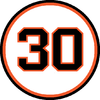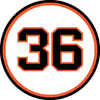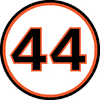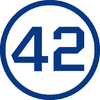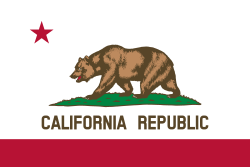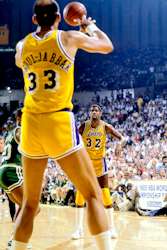San Francisco Giants
The San Francisco Giants are an American professional baseball team based in San Francisco, California. They compete in Major League Baseball (MLB) as a member club of the National League (NL) West division. Founded in 1883 as the New York Gothams, and renamed three years later the New York Giants, the team eventually moved to San Francisco in 1958.
| San Francisco Giants | |||||
|---|---|---|---|---|---|
| Established in 1883 | |||||
| Based in San Francisco since 1958 | |||||
| |||||
| Major league affiliations | |||||
| |||||
| Current uniform | |||||
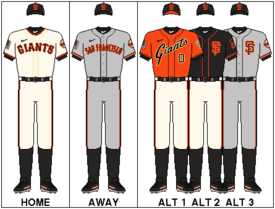 | |||||
| Retired numbers | |||||
| Colors | |||||
| Name | |||||
| |||||
| Other nicknames | |||||
| |||||
| Ballpark | |||||
| |||||
| Major league titles | |||||
| World Series titles (8) | |||||
| NL Pennants (23) |
| ||||
| West Division titles (8) |
| ||||
| Wild card berths (3) |
| ||||
| Front office | |||||
| Owner(s) | San Francisco Baseball Associates LLC[3][4] | ||||
| Manager | Gabe Kapler | ||||
| General Manager | Scott Harris | ||||
| President of Baseball Operations | Farhan Zaidi | ||||
As one of the longest-established and most successful professional baseball teams, the franchise has won the most games of any team in the history of American baseball.[5] The team was the first major league team based in New York City, most memorably playing at the legendary Polo Grounds. They have won 23 NL pennants and have played in 20 World Series competitions – both NL records. The Giants' eight World Series championships rank second in the National League and fifth overall (the New York Yankees are first with 27, then the St. Louis Cardinals (the National League record-holders) with 11, and the Oakland Athletics and the Boston Red Sox both with 9). The Giants have played in the World Series 20 times – 14 times in New York, six in San Francisco – but boycotted the event in 1904.
Playing as the New York Giants, they won 14 pennants and five World Series championships behind managers such as John McGraw and Bill Terry and players such as Christy Mathewson, Carl Hubbell, Mel Ott, Bobby Thomson, and Willie Mays. The Giants' franchise has the most Hall of Fame players in all of professional baseball.[6] The Giants' rivalry with the Los Angeles Dodgers is one of the longest-standing and biggest rivalries in American sports.[7][8] The teams began their rivalry as the New York Giants and Brooklyn Dodgers, respectively, before both franchises moved west for the 1958 season.
The Giants have won six National League pennants and three World Series championships since relocating to San Francisco. Those three championships came in 2010, 2012, and most recently in 2014, when they defeated the Kansas City Royals four games to three.[9][10]
The Giants were the only major professional sports team based in the City and County of San Francisco, following the San Francisco 49ers' relocation to Santa Clara in 2014 until they were joined by the Golden State Warriors when they moved to the Chase Center in 2019.
From 1883 to 2019, the Giants' overall win–loss record was 11,165–9,687 (a winning "percentage" of 0.535).[11]
Franchise history
New York Giants
The Giants originated in New York City as the New York Gothams in 1883 and were known as the New York Giants from 1885 until the team relocated to San Francisco after the 1957 season. During most of their 75 seasons in New York City, the Giants played home games at various incarnations of the Polo Grounds in Upper Manhattan.
Numerous inductees of the National Baseball Hall of Fame and Museum played for the New York Giants, including John McGraw, Mel Ott, Bill Terry, Willie Mays, Monte Irvin, and Travis Jackson. During the club's tenure in New York, they produced five of the franchise's eight World Series wins (1905, 1921, 1922, 1933, 1954) and 17 of its 23 National League pennants. Famous moments in the Giants' New York history include the 1922 World Series, in which the Giants swept the Yankees in four games, the 1951 home run by New York Giants outfielder and third baseman Bobby Thomson known as the "Shot Heard 'Round the World", and the defensive feat by Mays during Game 1 of the 1954 World Series known as "the Catch".
The Giants had intense rivalries with their fellow New York teams, the New York Yankees and the Brooklyn Dodgers. The Giants faced the Yankees in six World Series and played the league rival Dodgers multiple times per season. Games between any two of these three teams were known collectively as the Subway Series. The Dodgers-Giants rivalry continues, as both teams moved to California after the 1957 season, with the Dodgers relocating to Los Angeles. The New York Giants of the National Football League are named after the team.
San Francisco Giants
The Giants, along with their rival Los Angeles Dodgers, became the first Major League Baseball teams to ever play on the west coast. On April 15, 1958, the Giants played their first game in San Francisco, defeating the former Brooklyn and now Los Angeles Dodgers, 8–0. The Giants played for two seasons at Seals Stadium before moving to Candlestick Park in 1960. The Giants played at Candlestick Park until 1999, before opening Pacific Bell Park (now known as Oracle Park) in 2000, where the Giants currently play.
The Giants were unable to sustain success in their first 50 years in San Francisco. They made nine playoff appearances and won three NL pennants between 1958 and 2009. The Giants lost the 1962 World Series in seven games to the New York Yankees. The Giants were swept in the 1989 World Series by their cross-town rival Oakland Athletics, a series best known for the 1989 Loma Prieta earthquake causing a 10-day delay between Games 2 and 3. The Giants also lost the 2002 World Series to the Anaheim Angels. One of the team's biggest highlights during this time was the 2001 season, in which OF Barry Bonds hit 73 home runs, breaking the record for most home runs in a season. In 2007, Bonds would surpass Hank Aaron's career record of 755 home runs. Bonds finished his career with 762 home runs (586 hit with the Giants), still the MLB record.
The Giants won three World Series championships in 2010, 2012, and 2014, giving the team eight total World Series titles, including the five won as the New York Giants.
Players inducted into the National Baseball Hall of Fame and Museum as San Francisco Giants include 1B Orlando Cepeda P Juan Marichal, 1B Willie McCovey, and P Gaylord Perry.
Rivalries
The Giants' rivalry with the Los Angeles Dodgers dates back to when the two teams were based in New York, as does their rivalry with the New York Yankees. Their rivalry with the Oakland Athletics dates back to when the Giants were in New York and the A's were in Philadelphia and played each other in the 1905, 1911, & 1913 World Series, and was renewed in 1968 when the Athletics moved from Kansas City and the teams again played each other in the earthquake-interrupted 1989 Bay Bridge World Series. The 2010 NLCS inaugurated a Giants rivalry with the Philadelphia Phillies after confrontations between Jonathan Sánchez and Chase Utley, and between Ramón Ramírez and Shane Victorino. However, with the Philadelphia Phillies dropping off as one of the premier teams of the National League, this rivalry has died down since 2010 and 2011. Another rivalry that has intensified recently is with the St. Louis Cardinals, whom the team has faced 4 times in the NLCS.
The rivalry between the New York Giants and Chicago Cubs in the early 20th century was once regarded as one of the most heated in baseball,[12] with Merkle's Boner leading to a 1908 season-ending matchup in New York of particular note. That historical rivalry was revisited when the Giants beat the Cubs in the 1989 NL playoffs, in their tiebreaker game in Chicago at the end of the 1998 season, and on June 6, 2012 in a "Turn Back The Century" game in which both teams wore replica 1912 uniforms.[13]
Los Angeles Dodgers
The Giants-Dodgers rivalry is one of the greatest and longest-standing rivalries in team sports, and has been regarded as the most intense in American baseball.[7][8]
The Giants-Dodgers feud began in the late 19th century when both clubs were based in New York City, with the Dodgers based in Brooklyn and the Giants playing at the Polo Grounds in upper Manhattan. After the 1957 season, Dodgers owner Walter O'Malley decided to move the team to Los Angeles primarily for financial reasons.[14] Along the way, he managed to convince Giants owner Horace Stoneham (who was considering moving his team to Minnesota) to preserve the rivalry by taking his team to San Francisco as well.[14] New York baseball fans were stunned and heartbroken by the move.[14][15] Given that the cities of Los Angeles and San Francisco have long been competitors in economic, cultural and political arenas, their new California venues became fertile ground for transplantation of the ancient rivalry.
Both teams' having endured for over a century while leaping across an entire continent, as well as the rivalry's growth from cross-city to cross-state, have led to its being considered one of the greatest in sports history.[16][17][18]
The Giants-Dodgers rivalry has been marked by the Giants' slightly better success. While the Giants have more total wins, head-to-head wins, National League pennants and World Series titles in their franchise histories, the Dodgers have won the National League West 5 more times than the Giants since the start of division play in 1969. Both teams have made the postseason as a National League wild card twice. The Giants won their first world championship in California in 2010, while the Dodgers won their last world title in 1988. As of the end of the 2014 baseball season, the Los Angeles Dodgers lead the San Francisco Giants in California World Series triumphs, 5–3, whereas in 20th century New York, the Giants led the Dodgers in World Series championships, 5–1. The combined franchise histories give the Giants an 8–6 edge in MLB championships, overall.
Oakland Athletics
A geographic rivalry with the cross-Bay American League Athletics greatly increased with the 1989 World Series, nicknamed the "Battle of the Bay", which Oakland swept (and which was interrupted by the Loma Prieta earthquake moments before the scheduled start of Game 3 in San Francisco). In addition, the introduction of interleague play in 1997 has pitted the two teams against each other for usually six games every season since 1997, three in each city (but only four in 2013, two in each city). Before 1997, they played each other only in Cactus League spring training. Their interleague play wins and losses (63–57 in favor of the A's) have been fairly evenly divided despite differences in league, style of play, stadium, payroll, fan base stereotypes, media coverage and World Series records, all of which have heightened the rivalry in recent years.[19] The intensity of the rivalry and how it is understood varies among Bay Area fans. A's fans generally view the Giants as a hated rival, while Giants fans generally view the A's as a friendly rival much lower on the scale. This is most likely due to the A's lack of a historical rival, while the Giants have their heated rivalry with the Dodgers. Some Bay Area fans are fans of both teams. The "split hats" that feature the logos of both teams best embodies the shared fan base. Other Bay Area fans view the competition between the two teams as a "friendly rivalry", with little actual hatred compared to similar ones such as the Subway Series (New York Mets vs. New York Yankees), the Red Line Series (Chicago Cubs vs. Chicago White Sox) and the Freeway Series (Los Angeles Dodgers vs. Los Angeles Angels of Anaheim).
The Giants and A's enjoyed a limited rivalry at the start of the 20th century before the Yankees began to dominate after the acquisition of Babe Ruth in 1920, when the Giants were in New York and the A's were in Philadelphia. The teams were managed by legendary leaders John McGraw and Connie Mack, who were considered not only friendly rivals but the premier managers during that era, especially in view of their longevity (Mack for 50 years, McGraw for 30) since both were majority owners. Each team played in five of the first 15 World Series (tying them with the Red Sox and Cubs for most World Series appearances during that time period). As the New York Giants and the Philadelphia A's, they met in three World Series, with the Giants winning in 1905 and the A's in 1911 & 1913. After becoming the San Francisco Giants and Oakland A's, they met in a fourth Series in 1989 resulting in the A's last world championship (as of 2018).
Historical rivalry
New York Yankees
Though in different leagues, the Giants have also been historical rivals of the Yankees,[20][21][22] starting in New York before the Giants moved to the West Coast. Before the institution of interleague play in 1997, the two teams had little opportunity to play each other except in seven World Series: 1921, 1922, 1923, 1936, 1937, 1951 and 1962, the Yankees winning last five of the seven Series. The teams have met five times in regular season interleague play: In 2002 at the old Yankee Stadium, in 2007 at Oracle Park (then known as AT&T Park), in 2013 and 2016 at the current Yankee Stadium, and in 2019 at Oracle Park. The teams' next regular season meetings will occur in 2022.
In a September 2013 meeting, Yankees 3B Alex Rodriguez hit a grand slam, breaking Lou Gehrig's grand slam record.
In his July 4, 1939 farewell speech ending with the renowned "Today, I consider myself the luckiest man on the face of the earth", Yankee slugger Lou Gehrig, who played in 2,130 consecutive games, declared that the Giants were a team he "would give his right arm to beat, and vice versa."[23]
Baseball Hall of Famers
As of 2012, the Major League Baseball Hall of Fame has inducted 66 representatives of the Giants (55 players and 11 managers) into the Hall of Fame, more than any other team in the history of baseball.
| San Francisco Giants Hall of Famers | ||||||||||||||||||
|---|---|---|---|---|---|---|---|---|---|---|---|---|---|---|---|---|---|---|
| Affiliation according to the National Baseball Hall of Fame and Museum | ||||||||||||||||||
|
Ford C. Frick Award recipients
| San Francisco Giants Ford C. Frick Award recipients | |||||||||
|---|---|---|---|---|---|---|---|---|---|
| Affiliation according to the National Baseball Hall of Fame and Museum | |||||||||
|
Other
The following inducted members of the Hall of Fame played or managed for the Giants, but either played for the Giants and were inducted as a manager having never managed the Giants, or managed the Giants and were inducted as a player having never played for the Giants:
- Cap Anson – inducted as player, managed Giants in 1898.
- Hughie Jennings – inducted as player, managed Giants from 1924 to 1925.
- Bill McKechnie – inducted as manager, played for Giants in 1916.
- Frank Robinson – inducted as player, managed Giants from 1981 to 1984.
- Casey Stengel – inducted as manager, played for Giants from 1921 to 1923.
Broadcasters Russ Hodges, Lon Simmons, and Jon Miller are permanently honored in the Hall's "Scribes & Mikemen" exhibit as a result of winning the Ford C. Frick Award in 1980, 2004, and 2010 respectively. As with all Frick Award winners, none are officially recognized as an inducted member of the Hall of Fame.
Giants in the Bay Area Sports Hall of Fame
| Giants in the Bay Area Sports Hall of Fame | ||||
| No. | Name | Position | Tenure | Notes |
|---|---|---|---|---|
| — | Bob Lurie | Owner | 1976–1993 | Born in San Francisco |
| — | Peter Magowan | Owner/President | 1993–2008 | Attended Stanford University |
| 1, 18 | Bill Rigney | IF Manager | 1946–1953 1956–1960, 1976 | Born and raised in Alameda |
| 2 | Dick Bartell | SS | 1935–1938 1941–1943, 1946 | Grew up in Alameda |
| 4 | Ernie Lombardi | C | 1943–1947 | Elected mainly on his performance with Cincinnati Reds, grew up in Oakland |
| 6 | Tony Lazzeri | 2B | 1939 | Elected mainly on his performance with New York Yankees, born and raised in San Francisco |
| 8 | Joe Morgan | 2B | 1981–1982 | Elected mainly on his performance with Cincinnati Reds, raised in Oakland |
| 9, 10, 60 | Matt Williams | 3B | 1987–1996 | |
| 12 | Dusty Baker | OF Manager | 1984 1993–2002 | |
| 14 | Vida Blue | P | 1978–1981 1985–1986 | Elected mainly on his performance with Oakland A's |
| 15 | Bruce Bochy | Manager | 2007–2019 | |
| 16 | Lefty O'Doul | LF | 1928 1933–1934 | Born in San Francisco |
| 18, 43 | Matt Cain | P | 2005–2017 | |
| 19, 33 | Dave Righetti | P Coach | 1991–1993 2000–2017 | Born and raised in San Jose |
| 20 | Frank Robinson | Manager | 1981–1984 | Elected mainly on his performance with Cincinnati Reds and Baltimore Orioles |
| 21 | Jeff Kent | 2B | 1997–2002 | Attended UC Berkeley |
| 22 | Will Clark | 1B | 1986–1993 | |
| 24 | Willie Mays | CF | 1951–1952 1954–1972 | |
| 25 | Barry Bonds | LF | 1993–2007 | Grew up in San Carlos |
| 27 | Juan Marichal | P | 1960–1973 | |
| 30 | Orlando Cepeda | 1B | 1958–1966 | |
| 36 | Gaylord Perry | P | 1962–1971 | |
| 43 | Dave Dravecky | P | 1987–1989 | |
| 44 | Willie McCovey | 1B | 1959–1973 1977–1980 | |
San Francisco Giants Wall of Famers
The Giants Wall of Fame recognizes retired players whose records stand highest among their teammates on the basis of longevity and achievements.
Those honored have played a minimum of nine seasons for the San Francisco Giants, or five seasons with at least one All-Star selection as a Giant.[24]
| Year | Year inducted |
|---|---|
| Bold | Member of the Baseball Hall of Fame |
| Member of the Baseball Hall of Fame as a Giant |
| San Francisco Giants Wall of Fame | ||||
| Year | No. | Name | Position(s) | Tenure |
|---|---|---|---|---|
| 2008 | 23, 49 | Felipe Alou | OF/1B Manager | 1958–1963 2003–2006 |
| 46 | Gary Lavelle | P | 1974–1984 | |
| 33 | Jim Barr | P | 1971–1978 1982–1983 | |
| 10 | Johnnie LeMaster | SS | 1975–1985 | |
| 14, 24 | Willie Mays | CF | 1951–1952, 1954–1972 | |
| 47 | Rod Beck | P | 1991–1997 | |
| 00, 20, 26 | Jeffrey Leonard | LF | 1981–1988 | |
| 14 | Vida Blue | P | 1978–1981 1985–1986 | |
| 8, 17, 19 | Kirt Manwaring | C | 1987–1996 | |
| 44 | Willie McCovey | 1B | 1959–1973 1977–1980 | |
| 42 | Bobby Bolin | P | 1961–1969 | |
| 27 | Juan Marichal | P | 1960–1973 | |
| 49 | Jeff Brantley | P | 1988–1993 | |
| 15, 22 | Jack Clark | RF/1B | 1975–1984 | |
| 29, 40 | Mike McCormick | P | 1956–1962 1967–1970 | |
| 15, 19 | Bob Brenly | C | 1981–1988 1989 | |
| 32, 33, 40, 51 | John Burkett | P | 1987 1990–1994 | |
| 23, 37 | Stu Miller | P | 1957–1962 | |
| 25 | Bobby Bonds | RF | 1968–1974 | |
| 30 | Orlando Cepeda | 1B | 1958–1966 | |
| 17, 39 | Randy Moffitt | P | 1972–1981 | |
| 38, 41 | Greg Minton | P | 1975–1987 | |
| 7, 9 | Kevin Mitchell | LF | 1987–1991 | |
| 22 | Will Clark | 1B | 1986–1993 | |
| 34, 39 | Mike Krukow | P | 1983–1989 | |
| 12 | Jim Davenport | 3B Manager | 1958–1970 1985 | |
| 26, 50 | John Montefusco | P | 1974–1980 | |
| 30, 33 | Chili Davis | OF | 1981–1987 | |
| 9, 10, 60 | Matt Williams | 3B | 1987–1996 | |
| 31 | Robb Nen | P | 1998–2002 | |
| 2 | Dick Dietz | C | 1966–1971 | |
| 22, 28, 35, 36 | Gaylord Perry | P | 1962–1971 | |
| 41 | Darrell Evans | 3B/1B | 1976–1983 | |
| 16 | Jim Ray Hart | 3B/LF | 1963–1973 | |
| 48 | Rick Reuschel | P | 1987–1991 | |
| 6 | J. T. Snow | 1B | 1997–2005 2008 | |
| 23, 26, 29 | Tito Fuentes | 2B | 1965–1974 | |
| 42, 45, 46 | Kirk Rueter | P | 1996–2005 | |
| 31, 43, 50, 52, 54 | Scott Garrelts | P | 1982–1991 | |
| 6 | Robby Thompson | 2B | 1986–1996 | |
| 5, 51 | Tom Haller | C | 1961–1967 | |
| 2, 35 | Chris Speier | SS | 1971–1977 1987–1989 | |
| 7, 14, 17 | Atlee Hammaker | P | 1982–1985 1987–1990 | |
| 2009 | 21 | Jeff Kent | 2B | 1997–2002 |
| 2010 | 33, 35, 57 | Rich Aurilia | SS | 1995–2003 2007–2009 |
| 36, 55 | Shawn Estes | P | 1995–2001 | |
| 2011 | 7, 56 | Marvin Benard | OF | 1995–2003 |
| 29 | Jason Schmidt | P | 2001–2006 | |
| 2017 | 25 | Barry Bonds | LF | 1993–2007 |
| 2018 | 18, 43 | Matt Cain | P | 2005–2017 |
| 33, 38 | Brian Wilson | P | 2006–2012 | |
| 14, 32, 51 | Ryan Vogelsong | P | 2000–2001 2011–2015 | |
| 2019 | — | Peter Magowan | Managing General Partner | 1993–2008 |
Retired numbers
The Giants have retired 11 numbers in the history of the franchise, most recently Barry Bonds' number 25 in 2018.
|
* Retired throughout the major leagues; Robinson actually was traded to the Giants, but retired before playing a game for them.
Of the Giants whose numbers have been retired, all but Bonds have been elected to the National Baseball Hall of Fame. In 1944, Carl Hubbell (#11) became the first National Leaguer to have his number retired by his team.[25] Bill Terry (#3), Mel Ott (#4), and Hubbell played and/or managed their entire careers for the New York Giants. Willie Mays (#24) began his career in New York, moving with the Giants to San Francisco in 1958; he did not play in most of 1952 and all of 1953 due to his service in the Korean War. Mathewson and McGraw are honored by the Giants, but played in an era before uniform numbers became standard in baseball.
It was announced that the Giants will retire Will Clark's #22 on July 11, 2020.[26]
Also honored
John McGraw (3B, 1902–06; manager, 1902–32) and Christy Mathewson (P, 1900–16), who were members of the New York Giants before the introduction of uniform numbers, have the letters "NY" displayed in place of a number.
Broadcasters Lon Simmons (1958–73, 1976–78, 1996–2002 & 2006), Russ Hodges (1949–70), and Jon Miller (1997–current) are each represented by an old-style radio microphone displayed in place of a number.
The Giants present the Willie Mac Award annually to the player that best exemplifies the spirit and leadership shown by Willie McCovey throughout his career.
Team captains
The Giants have had a number of captains over the years:
- Jack Doyle 1902
- Dan McGann 1903–1907[27][28]
- Larry Doyle 1908–1916
- Gus Mancuso 1937–1938
- Mel Ott 1939–1947
- Alvin Dark 1950–1956
- Willie Mays 1961–1972
- Willie McCovey 1977–1980
- Darrell Evans 1980–1983
- Jack Clark 1984
Season records
All-time regular season record: 11,165–9,687 (.535)[29] (through 2019 season)
Roster
San Francisco Giants 2020 spring training roster | ||||||
|---|---|---|---|---|---|---|
| 40-man roster | Non-roster invitees | Coaches/Other | ||||
|
Pitchers
|
Catchers
Infielders
Outfielders
|
Pitchers
Catchers
Infielders
Outfielders
|
Manager
Coaches
60-day injured list
28 active, 2 inactive, 13 non-roster invitees
| |||
Minor league affiliations
| Level | Team | League | Location |
|---|---|---|---|
| AAA | Sacramento River Cats | Pacific Coast League | West Sacramento, California |
| AA | Richmond Flying Squirrels | Eastern League | Richmond, Virginia |
| Advanced A | San Jose Giants | California League | San Jose, California |
| A | Augusta GreenJackets | South Atlantic League | North Augusta, South Carolina |
| Short Season A | Salem-Keizer Volcanoes | Northwest League | Keizer, Oregon |
| Rookie | AZL Giants | Arizona League | Scottsdale, Arizona |
| DSL Giants | Dominican Summer League | Boca Chica, Dominican Republic |
Radio and television
Giants' television telecasts are split between NBC-owned KNTV (broadcast) and NBC Sports Bay Area (cable). KNTV's broadcast contract with the Giants began in 2008, one year after the team and KTVU mutually ended a relationship that dated to 1961.[30] Jon Miller regularly calls the action on KNTV, while the announcing team for NBCSBA telecasts is Mike Krukow and Duane Kuiper, affectionately known as "Kruk and Kuip" (pronounced "Kruke" and "Kype"). During the 2016 season, the Giants had an average 4.71 rating and 117,000 viewers on primetime TV broadcasts.[31]
The Giants' flagship radio station is KNBR (680 AM). KNBR's owner, Cumulus Media, is a limited partner in San Francisco Baseball Associates LP, the owner of the team.[32] Jon Miller and Dave Flemming are the regular play-by-play announcers. In addition to KNBR, the Giants can be heard throughout Northern California and parts of Nevada, Oregon, and Hawaii on the Giants Radio Network. When games are televised on KNTV, Kuiper replaces Miller on the radio, and Miller goes to television. Erwin Higueros and Tito Fuentes handle Spanish-language radio broadcasts on KXZM (93.7 FM).
Home run call glitch
On May 28, 2006, Flemming called the 715th career home run of Barry Bonds, which moved Bonds into second on the all-time home run list. Unfortunately, the power from Flemming's microphone to the transmitter cut off while the ball was in flight, so the radio audience heard only crowd noise. Greg Papa took over the broadcast and apologized to listeners. Kuiper's TV call was submitted to the Baseball Hall of Fame as an artifact, instead of the usual radio call.
Fight song and other music
First used for Giants radio broadcasts on KSFO, the team's fight song "Bye, Bye Baby!" is currently used following any Giants home run. The song is played in the stadium, and an instrumental version is played on telecasts when the inning in which the home run was hit concludes. The title and chorus "Bye bye baby!" coming from famed former Giants broadcaster Russ Hodges, which was his home run call.
Following a Giants home win, Tony Bennett's "I Left My Heart in San Francisco" is played in Oracle Park in celebration.
See also
- List of San Francisco Giants team records
- San Francisco Giants general managers and managers
References
- "San Francisco Giants Uniforms 1958 - Present". SFGiants.com. MLB Advanced Media. Retrieved October 24, 2019.
- Newman, Mark (October 9, 2014). "Everybody at the World Series could find themselves wearing the same colors". MLB.com. MLB Advanced Media. Retrieved January 11, 2019.
For the first time in MLB history, two teams could bring the same color scheme to the World Series. The San Francisco Giants' official colors are listed as black, orange, metallic gold and cream. The Baltimore Orioles' are orange, black and white. Those teams never have met in a Fall Classic, not even a Jim Palmer vs. Willie Mays matchup back in the day.
- "Giants Staff Directory" (PDF). 2014 San Francisco Giants Media Guide. MLB Advanced Media. March 28, 2014. Retrieved July 28, 2015.
- Shea, Bill (October 28, 2012). "Low-key ownership style suits SanFranciso Giants' Johnson". Crains Detroit Business. Retrieved July 27, 2014.
- "Games Won by Teams Records". baseball-almanac.com. 2014. Retrieved December 5, 2014.
- "Giants Hall of Famers". Mlb.mlb.com. June 19, 2012. Retrieved October 31, 2012.
- "Baseball's top 10 rivalries".
- Woolsey, Matt. "In Depth: Baseball's Most Intense Rivalries". Forbes.
- Rose, Adam (November 1, 2010). "Giants World Series Champions 2010: San Francisco Tops Texas Rangers In World Series Game 5". huffingtonpost.com. Retrieved November 2, 2012.
- Keh, Andrew (October 29, 2012). "With a Sweep, Giants Are Champions Again". New York Times. Retrieved November 2, 2012.
- "San Francisco Giants Team History & Encyclopedia". Baseball-Reference. Sports Reference LLC. Retrieved June 8, 2019.
- A Cunning Kind of Play: The Cubs–Giants Rivalry, 1876–1932 by Warren N. Wilbert
- "Giants, Cubs commemorate 1912 | SFGiants.com: News". Sanfrancisco.giants.mlb.com. Retrieved October 31, 2012.
- Murphy, Robert (2009). After many a summer: the passing of the Giants and Dodgers and a golden age in New York baseball. New York: Sterling. ISBN 978-1-4027-6068-6.
- Sullivan, Neil J. (1987). The Dodgers move west: the transfer of the Brooklyn baseball franchise to Los Angeles. New York: Oxford University Press. ISBN 0-19-504366-9.
- "The 10 greatest rivalries". ESPN. January 3, 2000.
- Caple, Jim (September 16, 2002). "Giants-Dodgers best rivalry in baseball". ESPN.
- Beard, Donald (March 30, 2005). "Giants-Dodgers Covers a Lot of Ground". The Washington Post. p. H05. Archived from the original on June 28, 2011.
- "Head-to-Head record for Oakland Athletics against the listed opponents from 1997 to 2014".
- Stout, Glenn (2002). Yankees Century: 100 Years of New York Yankees Baseball. Houghton Mifflin. p. 290. ISBN 0-618-08527-0.
- Neft, David (2006). The Sports Encyclopedia: Baseball 2006. St. Martin's Press. p. 351. ISBN 0-312-35001-5.
- Wynne, Brian (1984). The Book of Sports Trophies. Cornwall Books. p. 37.
- "Lou Gehrig's Farewell Speech". LouGehrig.com. Archived from the original on September 7, 2009. Retrieved September 10, 2009.
- "Wall of Fame - Oracle Park". MLB.com. Retrieved March 5, 2019.
- Ott, Tim (June 18, 2003). "Gehrig's No. 4 was first retired number". MLB. Archived from the original on March 7, 2009.
- "Giants to retire Will Clark's No. 22 next year". ESPN.com. August 12, 2019. Retrieved August 12, 2019.
- "Dan McGann A Suicide – Giants' Former Captain Shoots Him- self in a Hotel at Louisville". New York Times. December 14, 1910. p. 14. Retrieved July 24, 2019.
- "Giants New Captain May Be Joe Kelley – Bowerman or Browne to be Traded for Cincinnatian – Champions to be Shaken Up – President Brush In St. Louis Trying, It Is Said, to Secure Grady and Shay". New York Times. July 10, 1906. p. 4. Retrieved July 24, 2019.
- "San Francisco Giants Team History & Encyclopedia". Baseball-Reference.com.
- Kroner, Steve (November 2, 2007). "Giants are moving to KNTV". San Francisco Chronicle. Retrieved September 18, 2009.
- Here Are The 2016 MLB Prime Time Television Ratings For Each Team - Maury Brown, Forbes SportsMoney, 28 September 2016
- Cumulus Media, Inc. (December 31, 2012). "Notes to consolidated financial statements". Annual report to the Securities and Exchange Commission on Form 10-K. p. F-14.
General reference
- Hynd, Noel (1988). The Giants of the Polo Grounds: The Glorious Times of Baseball's New York Giants. New York: Doubleday. ISBN 0-385-23790-1.
External links
| Wikimedia Commons has media related to San Francisco Giants. |
- San Francisco Giants official website
- San Francisco Giants Team History & Encyclopedia Baseball Reference
- Sports E-Cyclopedia San Francisco Giants Page History and Pictures
- Robert Lurie talks at the Commonwealth Club in 1976 about the process of keeping the Giants in San Francisco (from the Commonwealth Club records at the Hoover Institution)
| Achievements | ||
|---|---|---|
| Preceded by Pittsburgh Pirates 1901 and 1902 and 1903 |
National League champions New York Giants 1905 |
Succeeded by Chicago Cubs 1906 and 1907 and 1908 |
| Preceded by Boston Red Sox 1903 |
World Series champions New York Giants 1905 |
Succeeded by Chicago White Sox 1906 |
| Preceded by Chicago Cubs 1910 |
National League champions New York Giants 1911 and 1912 and 1913 |
Succeeded by Boston Braves 1914 |
| Preceded by Brooklyn Dodgers 1916 |
National League champions New York Giants 1917 |
Succeeded by Chicago Cubs 1918 |
| Preceded by Brooklyn Dodgers 1916 |
National League champions New York Giants 1917 |
Succeeded by Chicago Cubs 1918 |
| Preceded by Brooklyn Dodgers 1920 |
National League champions New York Giants 1921 and 1922 and 1923 and 1924 |
Succeeded by Pittsburgh Pirates 1925 |
| Preceded by Cleveland Indians 1920 |
World Series champions New York Giants 1921 & 1922 |
Succeeded by New York Yankees 1923 |
| Preceded by Chicago Cubs 1932 |
National League champions New York Giants 1933 |
Succeeded by St. Louis Cardinals 1934 |
| Preceded by New York Yankees 1932 |
World Series champions New York Giants 1933 |
Succeeded by St. Louis Cardinals 1934 |
| Preceded by Chicago Cubs 1935 |
National League champions New York Giants 1936 and 1937 |
Succeeded by Chicago Cubs 1938 |
| Preceded by Philadelphia Phillies 1950 |
National League champions New York Giants 1951 |
Succeeded by Brooklyn Dodgers 1952 and 1953 |
| Preceded by Brooklyn Dodgers 1952 and 1953 |
National League champions New York Giants 1954 |
Succeeded by Brooklyn Dodgers 1955 and 1956 |
| Preceded by New York Yankees 1949–1953 |
World Series champions New York Giants 1954 |
Succeeded by Brooklyn Dodgers 1955 |
| Preceded by Cincinnati Reds 1961 |
National League champions San Francisco Giants 1962 |
Succeeded by Los Angeles Dodgers 1963 |
| Preceded by Los Angeles Dodgers 1988 |
National League champions San Francisco Giants 1989 |
Succeeded by Cincinnati Reds 1990 |
| Preceded by Arizona Diamondbacks 2001 |
National League champions San Francisco Giants 2002 |
Succeeded by Florida Marlins 2003 |
| Preceded by Philadelphia Phillies 2009 |
National League champions San Francisco Giants 2010 |
Succeeded by St. Louis Cardinals 2011 |
| Preceded by New York Yankees 2009 |
World Series champions San Francisco Giants 2010 |
Succeeded by St. Louis Cardinals 2011 |
| Preceded by St. Louis Cardinals 2011 |
National League champions San Francisco Giants 2012 |
Succeeded by St. Louis Cardinals 2013 |
| Preceded by St. Louis Cardinals 2011 |
World Series champions San Francisco Giants 2012 |
Succeeded by Boston Red Sox 2013 |
| Preceded by St. Louis Cardinals 2013 |
National League champions San Francisco Giants 2014 |
Succeeded by New York Mets 2015 |
| Preceded by Boston Red Sox 2013 |
World Series champions San Francisco Giants 2014 |
Succeeded by Kansas City Royals 2015 |


